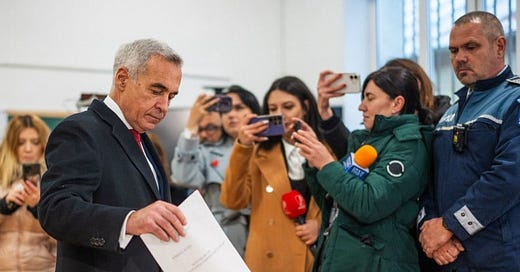What Happens When Influence Campaigns Distort Democracy?
Romania just threw out the results of its first round of presidential voting—and the reason is something democracies worldwide are going to wrestle with more and more: social media influence campaigns. The Constitutional Court annulled the election, pointing to a Russian-backed campaign that boosted an unexpected candidate, Călin Georgescu, into the spotlight. What makes this even more controversial? The court’s ruling is final and not open to appeal.
Both Georgescu and runner-up Elena Lasconi are furious. Georgescu called the move an “officialized coup,” and Lasconi also criticized the court’s decision. But this whole situation highlights a deeper problem: What should a country do when there’s no evidence of direct vote tampering, but the results have clearly been distorted by foreign influence?
TikTok and the Russian Influence Campaign
Here’s what happened: TikTok confirmed that it took down multiple networks pushing pro-Georgescu content, many of which were tied to Russian actors. These networks used sophisticated tactics to amplify Georgescu’s candidacy, presenting him as a fresh, anti-establishment choice. The Romanian court even suggested TikTok might have given Georgescu preferential treatment by letting this content thrive, significantly influencing voters.
To be clear, there’s no evidence that the votes were tampered with—this wasn’t a case of hacking voting machines or stuffing ballot boxes. However, the court ruled that the manipulation of voter perceptions through social media was so extensive that the results couldn’t stand. That’s why the election was annulled, and since the court’s ruling is final, there’s no going back.
Social Media’s Growing Role in Election Interference
This isn’t a new story. Russia’s use of social media to interfere in elections has been a recurring theme, especially in the United States. In 2016, Russia ran an extensive campaign to sway public opinion in favor of Donald Trump. While investigators didn’t find proof of direct coordination between the Trump campaign and Russian operatives, they confirmed that the interference was real and targeted. The same accusations came up in the 2020 and 2024 U.S. elections.
What makes Romania’s case stand out is its response. In the U.S., even when there’s clear evidence of foreign influence, election results haven’t been overturned. That’s because democracies like the U.S. have historically valued the finality of election outcomes and avoided setting a precedent where results can be invalidated due to influence campaigns. Romania, however, decided it couldn’t let the election stand after such blatant manipulation.
The Gray Zone of Modern Elections
This is where things get tricky. What do you do when the voting process is fair, but the information shaping voters’ decisions has been poisoned by foreign actors? It’s a gray area that democracies aren’t equipped to handle yet.
Romania’s court made a bold move, but it raises some uncomfortable questions:
Where’s the line? Should an election be overturned just because there was a foreign influence campaign? What level of manipulation is too much?
What about social media platforms? TikTok’s algorithms likely played a role in amplifying the pro-Georgescu networks. Should platforms be held accountable for letting this happen, even if they acted after the fact?
How do you protect voter agency? Educating the public about misinformation campaigns is important, but is it enough when foreign actors are getting more sophisticated by the day?
Romania’s ruling is a wake-up call. It shows that influence campaigns don’t need to mess with the actual votes to cause chaos. By manipulating perceptions and controlling the narrative, they can distort elections without ever breaking into a ballot box.
What Happens Next?
The Romanian court’s decision sets a precedent and might inspire other democracies to rethink how they deal with social media-driven interference. At the same time, it reminds us just how vulnerable elections have become in the digital age. Influence campaigns are now part of the electoral battlefield, and governments and platforms alike need to step up their game to protect democratic processes.
But here’s the catch: there’s no one-size-fits-all solution. Overturning an election sets a dangerous precedent—what stops a losing party from crying “influence campaign” every time they don’t like the results? On the flip side, ignoring blatant manipulation feels like handing foreign actors a free pass to meddle.
Lessons for Democracies Everywhere
Romania’s decision to annul its presidential election underscores how fragile democratic systems can be in the age of social media. The rise of influence campaigns driven by foreign actors highlights the vulnerabilities in modern electoral processes and the need for proactive solutions. Democracies around the world can draw several key lessons from Romania’s experience.
First, countries must define clear thresholds for interference. Democracies need to establish specific criteria for when foreign influence crosses the line and demands action. With clear guidelines, it becomes easier to respond to manipulation decisively while maintaining public trust in the electoral system.
Second, social media platforms must be held accountable for amplifying harmful content. Companies like TikTok, whose algorithms have significant power over what content reaches voters, need to take responsibility for ensuring their platforms aren’t exploited by malicious actors. This includes investing in robust monitoring systems and swiftly taking action against coordinated influence campaigns.
Third, educating the public is critical. Teaching voters to recognize misinformation campaigns and critically evaluate the content they encounter online can significantly reduce the impact of foreign influence. However, such efforts must be continuous and evolve alongside the tactics of those spreading disinformation.
Finally, international collaboration is essential. Influence campaigns often operate across borders, targeting multiple countries simultaneously. Democracies must work together to share intelligence, develop best practices, and coordinate responses to protect their electoral systems from external threats.
Romania’s court may have closed the book on the first round of voting, but the story isn’t over. What happens next will test how democracies balance fairness, trust, and the messy realities of influence campaigns. Welcome to the age of social media elections, where the fight isn’t just for votes—it’s for the truth itself.


